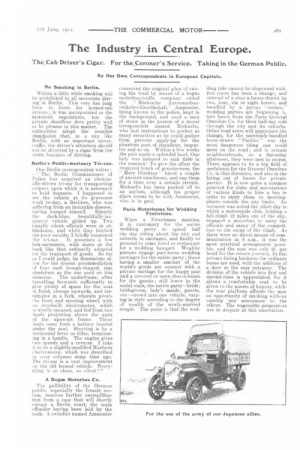The Industry in Central Europe.
Page 5

If you've noticed an error in this article please click here to report it so we can fix it.
The Cab Driver's Cigar. For the Coroner's Service. Taking in the German Public.
By Our Own Correspondents in European Capitals.
No Smoking in Berlin.
Within a little while smoking will be prohibited to all motorists driving in Berlin. This veto has long been in force for horsed-cab drivers ; it was incorporated in the motorcab regulations, but the private chauffeur does pretty well as he pleases in this matter. The authorities adopt the sensible standpoint that, in a city like Berlin, with an important streettraffic, the driver's attention should not be diverted by a cigar from the stern business of driving.
Berlin's Public-mortuary Tr-car.
Our Berlin correspondent writes : —" The Berlin Commissioner of Police has acquired an electrically-driven tri-car for transporting corpses upon which it is necessary to hold inquests. I happened to see the vehicle at its gruesome work to-day, a Berliner, who was suffering from an incurable disease, having hanged himself. Silently the dark-blue, beautifully-lacquered vehicle glided up. Two equally silent officials were in attendance, and while they fetched the poor suicide, I briefly examined the tri-car. It possesses a low box-carosserie, with doors at the hack like that ordinarily adopted f or the transport of goods. So far na I could judge, its dimensions allow for the decent accommodation of four such trough-shaped, zinc stretchers as the one used on this occasion. The underframe, after travelling forwards sufficiently to give plenty of space for the seat in front, sweeps upwards, and terminates in a fork, wherein pivots the front and steering wheel, with In overbuilt electromotor, which is wholly encased, and fed from two leads projecting above the apex -.If the upswept frame. These leads come from a, battery located under the seat. Steering is by a horizontal lever or tiller, terminating in a handle. The engine gives two speeds and a reverse. I take it to be a slightly-modified Harborn electromotor, which was described in your columns some time ago. The tri-car is a vast improvement en the old horsed vehicle. -Everything is so clean, so silent ! "
A Bogus Motorbus Co.
The gullibility of the German public, especially the female section, receives further exemplification from a case that will shortly occupy a Berlin court., the main offender having been laid by the heels. A swindler named Ammonier conceived the original plan of raising the wind by means of a bogus motorbus-traffie company called the " Markische Autoomnibusverkchrs-Gesellschaft." Ammonier, being known to the police, kept in the background, and used a man of straw in the person of a moral irresponsible named Michaelis, who had instructions to pocket, as many securities as he could gather from persons applying for the phantom post of chauffeur, inspector and so on. Within a few weeks the pair made a splendid haul. One lady was induced to sink S;500 in the concern ! To give the affair the required touch of genuineness, the Herr Direktor " hired a couple of ancient omnibuses, and ran them for a time over a certain stretch. Michaelis has been packed off to an asylum, although his proper place seems to be with Ammonier, who is in gaol.
Paris Motorbuses for Wedding Festivities.
When a Frenchman marries, it is customary for the entire wedding party to spend half the day riding about the city and suburbs in carriages, and finally to proceed to some hotel or restaurant for a wedding banquet. Wealthy persons engage pair-horse wedding carriages for the entire party ; those having a smaller amount of the world's goods are content with a private carriage for the happy pair and a covered or open char-h-bancs for the guests; still lower in the social scale, the entire party—bride, bridegroom, lady's maids, guests, etc.—crowd into one vehicle, varying in style according to the degree of wealth of the newly-married couple. The point is that the wed ding ride cannot be dispensed with. Hut there has been a, change, and instead of a char-a-banes drawn by two, four, six or eight horses, and handled by a joyous " cocher," wedding parties are beginning tt. hire buses from the Paris General Omnibus Co. for their half-day ride through the city and its suburbs. Other road users will appreciate the change, for the carelessly-handled horse-drawn " Pauline " was the most dangerous thing one could meet on the road ; and in certain neighbourhoods, on a Saturday afternoon, they were met in scores. There appears to be a big field of usefulness for the General Omnibus Co. in this direction, and also in the hiring out of buses for private parties. It is now quite a common practice for clubs and associations of various kinds to hire a bus in order to carry them to meetingplaces outside the city limits. An instance was noted the other day in which a motorcycle club, holding a hill-climb 12 miles out of the city, engaged a motorbus to carry the officials and many of the competitors to the scene of the climb. As there were no direct means of communication at 6 a.m., it was the most practical arrangement possible, and the cost was only 2s, per head for the return journey. In this private-hiring business the ordinary buses are used, with the addition of a, door at the rear entrance. The division of the vehicle into first and second-class is appreciated, for it allows a comfortable seat to be given to the guests of honour, while the rear platform affords the men an opportunity of smoking without causing any annoyance to the others. The wagonette proprietors are in despair at this innovation.


























